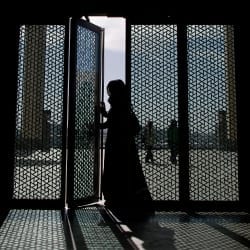Article 25 of Qatar’s constitution states, “Education is one of the basic pillars of social progress. The state shall ensure, foster and endeavor to spread it.” Qatar has invested tremendous resources in the development of its educational capacities and the growth of its knowledge-based economy. In a region characterized by the lack of opportunities for women, Qatar’s reforms have opened the floodgates of women’s opportunities in education and defined the small nation as a hub of research and higher learning within the greater Middle East. Just this month, the Independent rated Qatar as the best place in the world for a woman to attend university. Indeed, the rate of female tertiary enrollment is almost six times that of males in Qatar, with the gap on an upward trend over the past several years. From a policy perspective, what are the implications of the abundance of highly educated women in Qatar?
Qatar’s educational facilities and capabilities have grown with blistering speed over the past several decades. The shining example of this development is Education City, a utopian conglomerate of highly prestigious international universities, which was spearheaded by HH Sheikha Moza bint Nasser, wife of the former emir and chairperson of the Qatar Foundation for Education, Science and Community Development. Education City provides young Qatari women with the opportunity to study at world-class universities — an opportunity that their male counterparts often take advantage of abroad. Qatar’s cultural framework still limits women under the age of 25 from pursuing opportunities abroad without the accompaniment of a male guardian.
In Islamic societies, the educational realm is seen as an appropriate space for women, and therefore women tend to pursue degrees and positions within that field. Sheikha Abdulla Al-Misnad, president of Qatar University since 2003 and an active member of the Supreme Education Council, explained in a recent meeting with the author that women often choose to work in the education sector because it provides flexible schedules and adequate maternity leave, allowing women to both work and raise a family. Al-Misnad elaborated that women often choose not to work or study because of the desire to raise a family, not because of a lack of opportunities.
In the private sphere, the ever-increasing gap in education between men and women has complicated marriage prospects, as women are unlikely to choose a partner with a comparatively lower education level, according to Ghada Khalifa Al-Subaey, a program officer for Qatar’s Educate a Child initiative. As women increasingly choose to take advantage of the educational opportunities available to them, they are delaying marriage. At the same time, the fertility rate is decreasing, which offsets the exponential increase in Qatar’s population seen in the past several years. The vast number of highly educated women is helping create a more sustainable Qatari population.
How can Qatar mobilize these highly educated and ambitious young women to promote development in their country? Concerning women’s participation in the labor force, high levels of education do not guarantee that women will find work opportunities. Although Qatar has the highest rate of women’s labor force participation of all Gulf countries at 51 percent, it should continue to develop policies that encourage women to enter the workforce. Qatar should embrace its population of highly educated women and encourage them, through training programs and outreach campaigns, to reinvest their energies in the education system as teachers, professors and administrators. Qatar University has a high number of female department chairs across a wide range of disciplines, and the schools of Education City would do well to follow this example. Additionally, the Supreme Education Council should have more female representation on its board of directors. Women must be encouraged to put their education to use in the workforce and contribute to the country’s development. Because Qatari women are at the forefront of education, they should also lead policymaking and play key roles in the administration of the education sector.
Ariana Marnicio is the research analyst for the Women’s Rights in the Middle East Program. She graduated from Georgetown University with a degree in Arabic, and has lived in Egypt, Jordan and Oman. Her areas of interest include Arab culture, Islam and sexuality studies.
